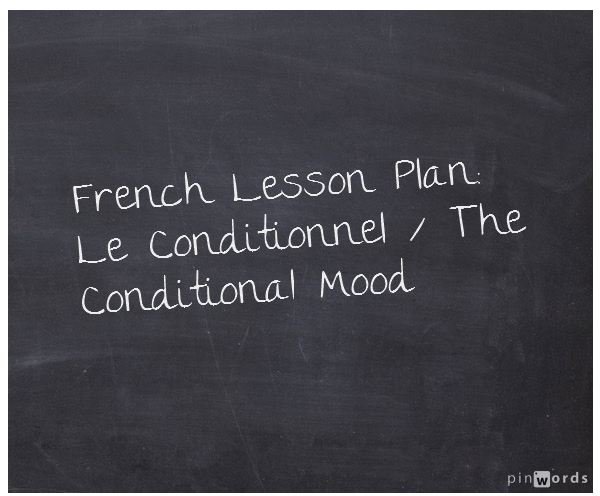The Conditional Mood / Le Conditionnel - French Lesson Plan
Language level: should be easily adaptable to different levels, but this is geared more towards beginners..
Grade level: 7th grade through university
I’ve kept the format very simple to avoid too many layout issues. Paste the text into a document, so you can make the changes you’d like to make, and you can give copies to your students.
I. The Forms
A. For many verbs, use the infinitive of the verb (drop the -e from an -re ending)(same stem for Le Futur) plus the following endings: -ais, -ais, -ait, -ions, -iez, -aient. (same as Imparfait endings)
B. You’ll need to learn any irregular stems as you go. Some examples: aller = ir-, avoir = aur-, devoir = devr-, être = ser-, faire = fer-, falloir = faudr-, pouvoir = pourr-, savoir = saur-, venir = viendr-, voir = verr-, vouloir = voudr-, etc.
1. Yes, two I’s in some verbs, like “nous étudiions” for example, and you pronounce both. Normally, though, you would not find two vowels together.
2. Yes, the Je forms will sound like those in Le Futur (Je regarderai / Je regarderais)
II. What is it For?
A. In general, the Conditional is for the hypothetical–what might or could happen, what may be possible, but may depend on conditions (if). It can also be for a polite request (see vouloir, for example). In many cases, it will be the equivalent of “would” in English. Note: Remember, the use of “would always” or “used to” for a regular occurring event in the past would be in the Imperfect, not the Conditional.
B. Here are three very, important and useful verbs for beginners in the Conditional.
1. vouloir: to want / COND: would like – Je voudrais
(a) The Conditional softens the “I want” of the present tense of the verb, making it sound more polite.
(b) Asking, “Voudriez-vous…?” can be used for “Would you like…?”
2. devoir: must, have to / COND: should – Je devrais
3. pouvoir: to be able, can / COND: could – Je pourrais
(a) The Conditional changes “can” to a possibility (could).
(b) Asking, “Pourriez-vous…?” can be used for “Could you…?”
III. More Examples
A. The Conditional and Imperfect are often used together in an “if” statement The Conditional states what would be or what would happen if the clause in the Imperfect were the case.
1. J’irais si j’avais le temps. (I would go if I had the time.)
2. Si j’étais riche, j’achèterais une maison. (If I were rich, I would buy a house.)
B. You can also use the Conditional without “if” clause–as in what someone said or wrote they would do, for example. Or, you might use a “mais” clause.
1. Marc a dit qu’il arriverait à l’heure. (Marc said he would arrive on time.)
2. Ma tante m’a écrit qu’elle viendrait en juin. (My aunt wrote me that she would come in June.)
3. J’irais au cinéma avec mes amis, mais je travaille ce soir. (I would go to the movies with my friends, but I work tonight.)
